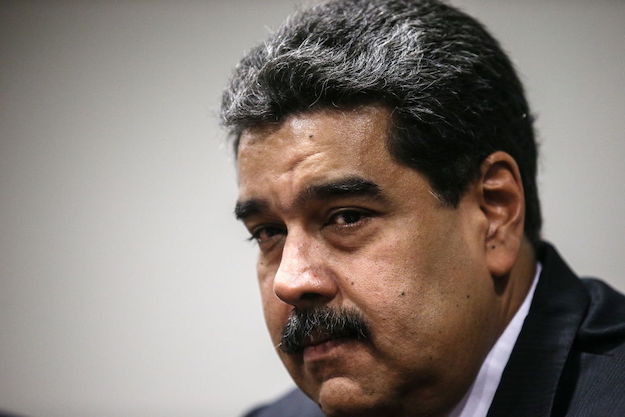Nicolás Maduro is set to start a new term as Venezuela’s president on Jan. 10, and the country’s political, social and economic crisis is only becoming more profound. Far from correcting course, Maduro has taken steps to maintain control despite an imploding economy. His opposition is dispersed and lacking a coherent strategy. A solution through dialogue seems farfetched.
How might things change for Venezuela? Here are three possibilities, and a look at the likelihood of any of them coming to fruition.
Foreign Military Intervention
For some time now there has been talk of possible military intervention to depose Maduro’s regime. Even U.S. President Donald Trump has made reference to it on occasion, as have OAS Secretary General Luis Almagro and Colombia’s President Iván Duque, albeit in an indirect manner.
But there are several reasons why intervention is very unlikely. First, there is no consensus among the largest countries in the region on the need to take an active hand in changing Venezuela’s reality. Mexico, especially under Andrés Manuel López Obrador, would oppose such action. The U.S. could decide to act on its own, but a decision to invade Venezuela would need to be approved by the U.S. Congress and the UN Security Council. At the UN, both China and Russia, countries with important economic interests in Venezuela, would most certainly veto any resolution to intervene.
But perhaps even more relevant is the precarious situation of the opposition forces in Venezuela. The political leadership in opposition to Maduro is weak and enjoys little support from civil society. Without an internal structure that can take the reins of the country if Maduro is deposed, the consequences of an intervention would be highly uncertain. Public support for Maduro’s regime is still around 20 percent, while the revolution proposed by his late predecessor Hugo Chávez has 35 percent approval. Military action in this circumstance is not a sensible idea. Any intervention would mean troops staying in Venezuela for a long time, until an internal structure can be consolidated to guarantee stability. The experience of the U.S. in similar situations, such as in Libya, suggests they would intervene only if they felt they had no other choice. Recent reports that Trump may add Venezuela to the state sponsors of terrorism list shows that the administration still sees the possibility of adding pressure on Maduro without intervening militarily.
Chavismo Collapses
For Maduro’s political movement to collapse, external pressure would have to be such as to cause a fracture within its power structure. This could come through an explosion of public protest that exceeds the regime’s containment capacity, and is big enough to compromise the loyalty of security forces tasked with putting it down. Another possibility is that international pressure asphyxiates the regime, rendering it incapable of maintaining the web of corruption and complicity it has had for the last 20 years.
These two possibilities are not mutually exclusive, but a social explosion of the magnitude needed to cause a revolt in the security services is not likely. Repression of protests in 2014 and 2017 battered public morale. The punishments then applied sowed terror and have been effective in discouraging people from confronting the government on the streets.
Even if it were to occur, the possibility that a popular uprising would bring the country closer to a political transition today is even lower than it was in previous years. If popular pressure again starts building on the streets, there is no political leadership or organization with both the know-how and the credibility to use that energy effectively against the regime.
As far as external pressure, the international community is working to tie the regime’s hands and sow doubts within its structure through sanctions and targeted arrests. Those actions do annoy Maduro and affect his regime. But they are not effective domestically. Destabilizing the regime from the outside without internal support may lead the country down a precarious route, at least if we consider the goal to be a democratic transition. Once again, the weakness of the Venezuelan opposition is an obstacle to any solution to the crisis. Venezuela today is an important issue on the agenda of many countries and international organizations. But how long the international pressure can continue at this level is uncertain.
Transition Within Chavismo
As mentioned, international pressure could cause the power structures to flounder and there might not be a democratic alternative to take control of the situation. That could already be happening, and the international community should be concerned about where that might lead.
If the absence of any possibility of a democratic transition, an intermediate alternative comes into view: a transition that leaves Chavismo in place, but gets rid of Maduro and his inner circle. There are multiple power sectors within Chavismo – some of which could be able to implement more moderate economic policies while limiting the corruption and permissiveness that today exists toward organized mafias and criminal groups. Such a system could mean allowing for certain economic freedoms – such as eliminating price controls and opening up the currency market – while continuing to limit political ones, such as fair elections, freedom of information, and separation of powers. It’s possible that the early stages of such a transition are underway. But it would be a difficult path to follow. If successfully navigated by both the international community and domestic opposition, such a transition might eventually pave the way to a democratic opening. But the risks of further entrenchment are apparent. It would be a risky bet.
—
Seijas Rodríguez, Ph.D., is a Venezuelan political analyst and statistician. He is the director of the Delphos poll.








